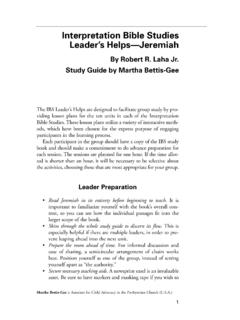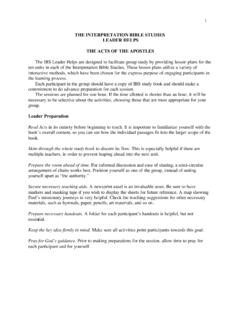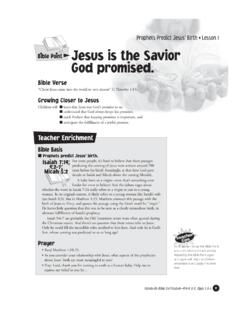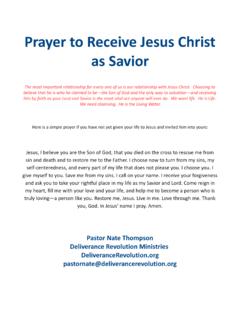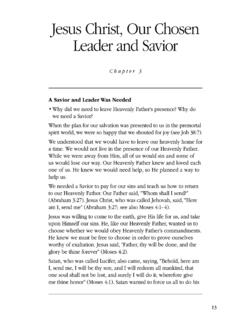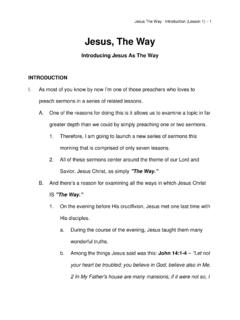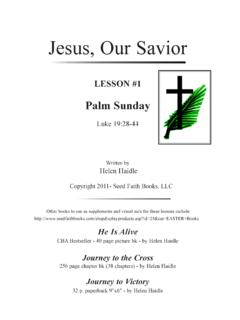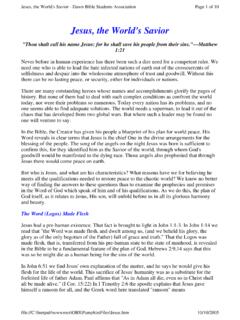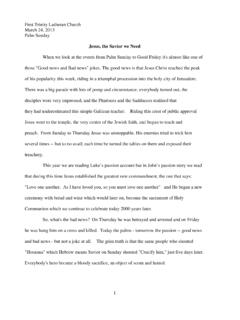Transcription of SG Jesus Savior - Presbyterian Publishing Corporation
1 Study Questions for William C. Placher sJesus the Savior Developed by John C. Van NuysPastor, Wabash Avenue Presbyterian Church Crawfordsville, IndianaPreface by William C. PlacherThe Wabash Avenue Presbyterian Church is my home church; I man elder in the congregation. Adult Sunday School classes there have tested out a good bit of my work, going back to the manuscript ofmy first book, A History of Christian Theology. It is a great joy to methat the current pastor is John Van Nuys, a former student of minewho went on after his undergraduate work at Wabash to receive at Vanderbilt and his from Wesley Theological Sem-inary.
2 In addition to his many other gifts, John is a wonderfulteacher and discussion leader. I happened to be on sabbatical when my most recent book, Jesusthe Savior , came out, so this time I couldn t lead discussions about itmyself. I was pleased when John offered to lead them over a period of four weeks. What follows are the study questions he developed for those sessions. They led to lively discussions. Readingthe whole book in four weeks moves quickly, but I think these ques-tions would facilitate good discussion in groups that took thingsmore slowly or read only parts of the book.
3 Since the group that methere consisted of my friends and neighbors, John naturally called me Bill all the way through, and we agreed not to change that infor-mal of Bill s assumptions is that the core of Christian teaching hascorrectly understood Jesus even though the New Testatment is not100 percent historically accurate. To what extent do you agree ordisagree with this beginning premise?Regarding this section on the incarnation, Bill s summary state-ment is: In the incarnation, Jesus revealed God s identity and trans-formed what it meant and ever after would mean to be human byuniting humanity with divinity (p.)
4 7). Is this what the incarnationreally accomplished? If so, what are the implications of that accom-plishment? If not, what exactly did the incarnation accomplish?Bill says, Christian faith holds that, if we know who Jesus reallyis, we will believe that he has saved us, and we will want to followhim (p. 9). Is that true? If it is, why aren t Christians that much dif-ferent from everyone else? What keeps us from truly following?According to Bill, If Jesus is divine, then learning about Jesusshows us who God is (p. 15). What is your primary image/under-standing of God?
5 Is it Jesus ? Or is Jesus separate from your under-standing of who God is? To which person of the Trinity do youprimarily pray? Some people find that Jesus is not the center of theirdevotional life; why do you think that is so?Bill claims that Christ reveals God as Mystery and Reckless you agree? Or are there other primary things that you feel Christreveals instead?Bill states (p. 43) that Christ s .. masculinity, in any stereo-typed sense of the word, does not form a central element of his char-acter (as with Samson or Abraham). Do you agree?
6 Is the fact thatJesus was male problematic? Is the Trinity a comfort or problem (or both) to you?Bill believes that Jesus did not know everything. When ponder-ing whether Jesus knew that he was the Word of God incarnate, Billsays: yes and no. What do you think?Bill s first section on the incarnation really seems to emphasize(following Irenaeus s emphasis on recapitulation) that Christ rede-fines what it means to be human by recapitulating the story ofhuman life: By uniting humanity with the divine, Christ changes211 Incarnationwhat it is to be human (p.)
7 46). The humanity in each of us isunited with divinity in Christ. Do you agree?How does what Bill say about abortion strike you? Why do youthink that he brought up this topic?How does Bill s treatment of the Christmas stories enlarge/chal-lenge your understanding of those stories? What was one thing you read or heard in this discussion thatmost intrigues/bothers/or encourages you?3 Study Questions for William C. Placher s Jesus the SaviorWhat is your favorite Gospel story and why?Bill says: I have no doubt that many of those [Gospel] stories are altered in detail, simplified, or sometimes just invented,but they nonetheless show us the kinds of things Jesus did, the sortsof things he taught, and, in these and other ways, the human beinghe was (p.
8 61). Do you agree with Bill s statement? Does it weakenyour faith, strengthen it, or both?According to Bill, The very form of [Mark s] story is .. a chal-lenge to the dominant standards, in his society and ours, of what isvaluable (p. 62). How so?Regarding the ministry of Jesus , Bill will discuss the following aspects:1. Jesus in relation to Hebrew prophetic tradition2. Jesus message regarding the reign of God3. Jesus identity as messenger of that message4. Jesus controversies regarding the implications of his mes-sage/identity as messenger5.
9 Issues of inclusion then/issues of inclusion now: homo-sexuality6. Implications for preachingBill places Jesus within the Hebrew prophetic tradition. Howwas Jesus like a prophet? (See page 69.)In chapter 8, Bill notes that Jesus immediate historical contextwas apocalyptic. What were the basic characteristics of the apoc-alyptic worldview?The major parties within the Judaism of Jesus time included:Sadducees (social engagement: temple focus ritual purity)Pharisees (social engagement: people focus moral purity)Zealots (social engagement: revolution)Essenes (social withdrawal: prayer and thereby revolution)422 Ministry5 How were Jesus teachings like and unlike their views?
10 The Gospels speak of the reign or kingdom of God as publicevent (Mark 13) and inner transformation (Luke 17). How arethose two pictures different? Some of Jesus parables use the image of a seed to talk about thereign or kingdom. What are the implications of that image? Jesus talks about the reign or kingdom as nonviolent and inclu-sive. What are the implications of those characteristics?The kingdom of God is central in Jesus message. Is the kingdomof God central to your faith? Central to the faith and practice of ourchurch? Why or why not?
